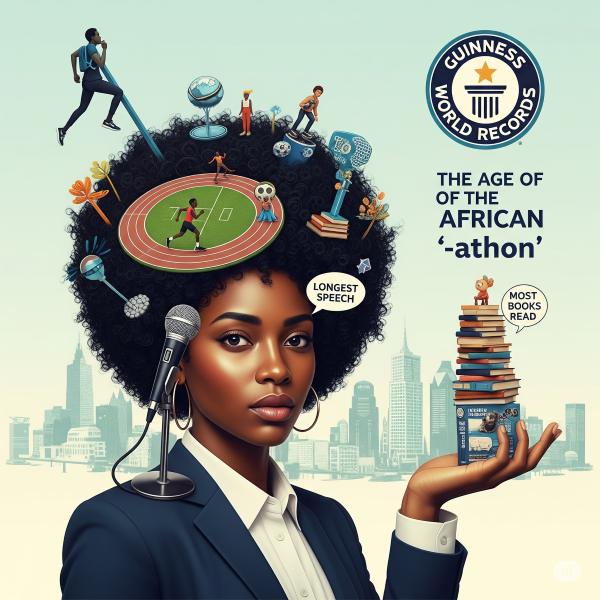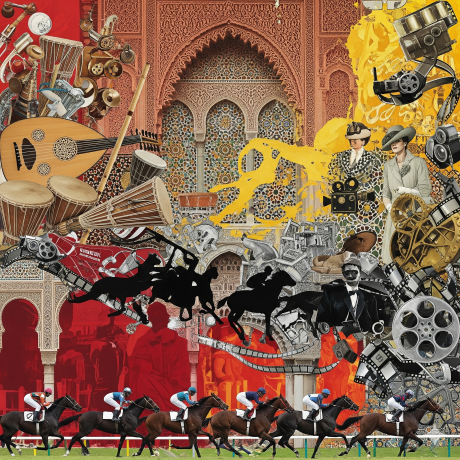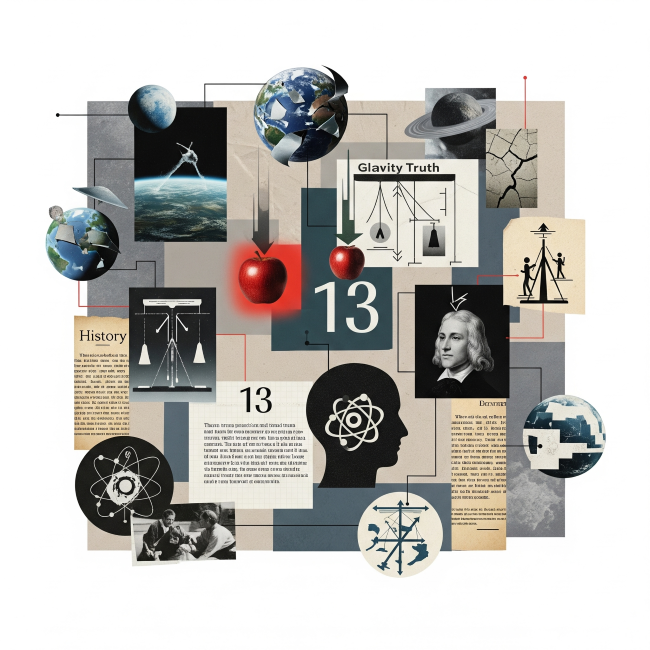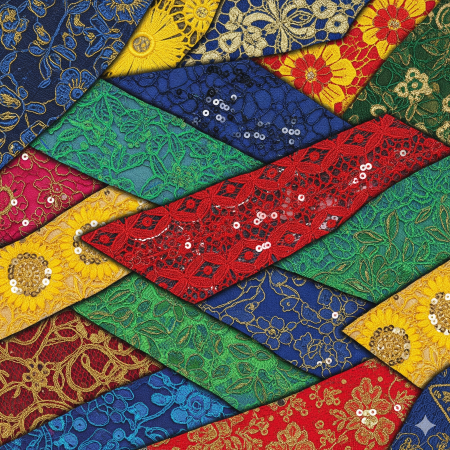Guinness World Records & The Age of the African “-athon”

It began, as things often do in this age, with a camera.
In May 2023, Nigerian chef Hilda Baci stood at her cooking station in Lagos, apron dusted with flour and adrenaline. What began as a personal challenge quickly transformed into a national moment.
For 93 hours and 11 minutes, nearly four days, she stirred, sautéed, plated, and smiled for the cameras.
When Guinness World Records officially certified her feat as the world’s longest cooking marathon, Nigeria erupted in celebration. The air seemed to carry the scent of jollof rice and something greater: destiny.
What followed was unexpected, though not entirely surprising. The cookathon sparked a wave of imitations, each more inventive than the last. Across the continent, the "-athon" craze took hold.
If Hilda could cook for four days, why not dance, sing, read, or even twerk into the record books? Suddenly, endurance stunts began sprouting everywhere—skipathons, readathons, and even speculative laughathons in Ibadan.
It was equal parts humor, pride, and hunger for recognition. The "-athon" became a symbol of African ambition, packaged for Guinness adjudicators and Instagram feeds alike.
The World Before Hilda Baci’s Cookathon
Image Credit: Punch Newspaper
For much of its history, Guinness World Records viewed Africa from a distance. Records involving the continent were far and in between.
There was Kimani Ng’ang’a Maruge, who enrolled in primary school at age 84, becoming the oldest person to do so. In 1962, Johannes Relleke survived more than 2,400 bee stings, an extraordinary testament to human resilience.
Culture
Read Between the Lines of African Society
Your Gateway to Africa's Untold Cultural Narratives.
Natural and cultural landmarks such as the Hoba meteorite in Namibia and the Great Mosque of Djenné in Mali have stood as enduring symbols of Africa’s uniqueness and historical depth.
Image Above: Hoba Meteorite
Morocco, meanwhile, has consistently impressed with its blend of heritage and modern accomplishments. The University of al-Qarawiyyin in Fez, founded in 859 by Fatima al-Fihri, holds the title of the world’s oldest university.
More recently, the Marrakech Storytelling Festival ran for over 80 hours, and footballer Youssef En-Nesyri made history by scoring the highest headed goal ever recorded in a World Cup, leaping 2.78 meters.
That dynamic has shifted. The past decade saw social media flatten the path to Guinness recognition. A cooking marathon in Lagos can now stream live to Minneapolis. A Ugandan applause marathon can trend in Tokyo.
The Year of the Record
In 2024, a wave of extraordinary achievements rippled across the continent. In Nigeria alone, readers, athletes, and artists pushed the boundaries of human persistence and creativity.
Fela Kutiwas posthumously recognized for releasing 46 studio albums over 23 years, the most by any solo artist. Rema topped the Official MENA Streaming Chart with "Calm Down," becoming the first African artist to do so.
Ewatomi Gbadamosi read aloud for 200 hours, only to be surpassed by Samson Ajao’s 215-hour effort.
John Okesola claimed to twerk for more than 76 hours. Martins Itua managed to visit 148 fast-food restaurants in a single day. Gbemi Giwa painted for 100 hours without pause. Let’s not forget Tunde Onakoya, who captured global attention when he played chess continuously for 58 hours in Times Square.
Sports and performance also had their champions. Peter Aho bowled six wickets for just five runs in a T20I match, a global best.
Chinonso Eche set records with 23 football headers in one minute while lying prone and 133 touches while balancing the ball on his head.
Meanwhile, athletes like Flora Ugwunwa, Paul Kehinde, and Blessing Okagbare achieved feats in javelin, powerlifting, and track events, while 15-year-old Kanyeyachukwu Tagbo-Okeke created the world’s largest art canvas in Abuja to raise awareness for autism.
Culture
Read Between the Lines of African Society
Your Gateway to Africa's Untold Cultural Narratives.
A Pan-African Endeavour
Image Credit: New York Post
Ghana, too, saw its share of glory. Abubakar Tahiru hugged 1,123 trees in a single hour. Evans Aryee broke strength records in carrying and lifting events. Ferdie Ato Adoboe ran 100 meters backward in just over 12 seconds.
Lewis Appiagyei set a lap record in Gran Turismo as a child, while Dickson Oppong achieved a bizarre feat by spraying water from his mouth at a record pace. Abdul Rashid drummed non-stop for over 123 hours, and two men, Daniel Ashitey Amarh and Richard Mensah Ofori, carried a person on their heads over an obstacle course faster than anyone before them.
From South Africa came records of both spirit and strength. Saray Khumalo became the first Black African woman to summit Mount Everest and later set a cycling fundraising record. Chad le Clos earned 143 gold medals in the FINA Swimming World Cup, the most by any male swimmer. Otto Thaning swam the English Channel at 73, becoming the oldest man to do so.
What’s Going On Here
These records are not merely oddities; they are tools of nation branding. Winning an Olympic medal requires immense infrastructure, while a dance or reading marathon demands little more than community support and a camera. These efforts have become a way to say: We are creative. We are resilient. We deserve to be seen.
In a global media landscape that too often defaults to crisis, these records act as joyful disruptions. A Kenyan runner sets a marathon record. A Ghanaian tree hugger champions the environment. Each act counters the narrative of deficiency and presents a new story—one driven by joy, persistence, and imagination.
The Social Media Multiplier
If Hilda’s cookathon was the spark, then TikTok, Instagram, and YouTube served as accelerants. Viewers didn’t just witness her journey; they joined it.
Culture
Read Between the Lines of African Society
Your Gateway to Africa's Untold Cultural Narratives.
At hour 12 or hour 200, audiences tuned in, commented, encouraged, and spread the spectacle. These records have become communal experiences—painted in kitchens, cheered on in dorm rooms, supported by entire neighborhoods. Sponsors and politicians soon caught on. Cultural pride became a broadcast event.
Beyond the “-athons”
While marathon-style stunts dominate headlines, Africa’s Guinness achievements extend far beyond endurance. They touch on heritage, athletic excellence, ecological activism, and technological prowess. From al-Qarawiyyin’s founding to Rema’s global streaming dominance, the records reveal a tapestry of ambition that stretches across centuries and disciplines.
Guinness World Records offer more than certificates or headlines. They are declarations of agency. They reframe Africa not as a continent to be pitied or saved, but as one filled with protagonists—makers of joy, bearers of culture, and architects of dreams.
For African audiences, these records ignite the imagination. If someone in your city can hug a thousand trees or read aloud for nine days, perhaps you too can find your form of brilliance.
Epilogue: What’s Next?
Image Above: Tunde Onakoya The Chess Champion. Credit: Al Jazeera
The records will evolve. For now, Africa appears to be in its marathon era. Somewhere in Accra, a karaoke challenge might be stirring to life. In Kampala, someone could be peeling matooke with an eye on global recognition. In Lagos, perhaps a smile-a-thon is being planned—not because the world asked for it, but simply because we can.
If Hilda Baci taught us anything, it’s this: with a cooking pot and a camera, today’s ordinary moment can become part of history.
You may also like...
Be Honest: Are You Actually Funny or Just Loud? Find Your Humour Type

Are you actually funny or just loud? Discover your humour type—from sarcastic to accidental comedian—and learn how your ...
Ndidi's Besiktas Revelation: Why He Chose Turkey Over Man Utd Dreams

Super Eagles midfielder Wilfred Ndidi explained his decision to join Besiktas, citing the club's appealing project, stro...
Tom Hardy Returns! Venom Roars Back to the Big Screen in New Movie!

Two years after its last cinematic outing, Venom is set to return in an animated feature film from Sony Pictures Animati...
Marvel Shakes Up Spider-Verse with Nicolas Cage's Groundbreaking New Series!

Nicolas Cage is set to star as Ben Reilly in the upcoming live-action 'Spider-Noir' series on Prime Video, moving beyond...
Bad Bunny's 'DtMF' Dominates Hot 100 with Chart-Topping Power!

A recent 'Ask Billboard' mailbag delves into Hot 100 chart specifics, featuring Bad Bunny's "DtMF" and Ella Langley's "C...
Shakira Stuns Mexico City with Massive Free Concert Announcement!

Shakira is set to conclude her historic Mexican tour trek with a free concert at Mexico City's iconic Zócalo on March 1,...
Glen Powell Reveals His Unexpected Favorite Christopher Nolan Film

A24's dark comedy "How to Make a Killing" is hitting theaters, starring Glen Powell, Topher Grace, and Jessica Henwick. ...
Wizkid & Pharrell Set New Male Style Standard in Leather and Satin Showdown

Wizkid and Pharrell Williams have sparked widespread speculation with a new, cryptic Instagram post. While the possibili...






